Politics
Pakistan’s JF-17 draws strong visitor interest at Dubai Airshow 2025
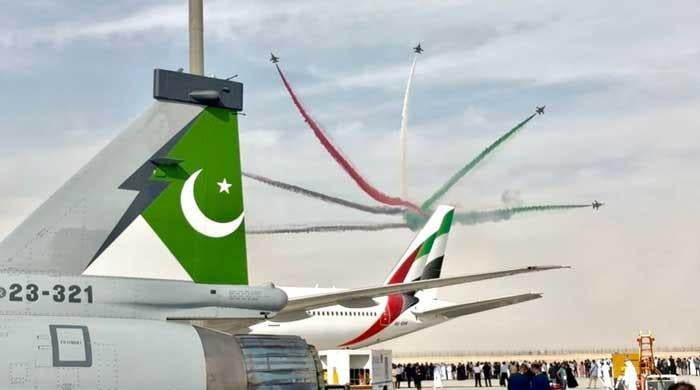
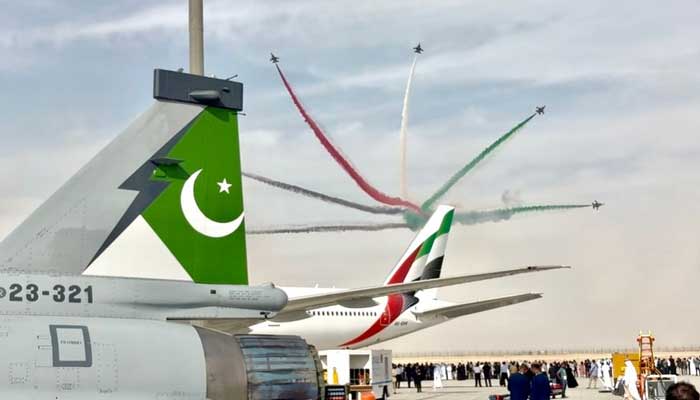
DUBAI: The Dubai Airshow 2025 opened at Al Maktoum International Airport on Monday, bringing together global aviation leaders, defence officials and industry experts for one of the region’s largest aerospace events.
Aircraft from Pakistan and the United Arab Emirates were parked side by side in the static display area, drawing attention from visitors who noted the close proximity of the two fleets.
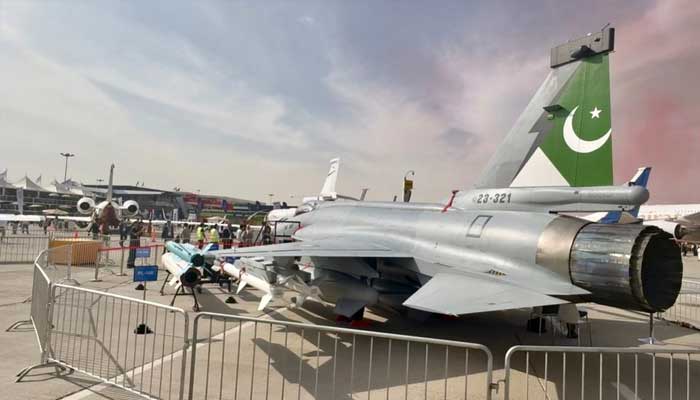
The arrangement was seen as a symbolic reflection of strong ties between the UAE and Pakistan in defence and aviation cooperation.
The skies above the airshow were dominated by colourful aerobatic displays as military and commercial jets performed precision manoeuvres throughout the opening day.
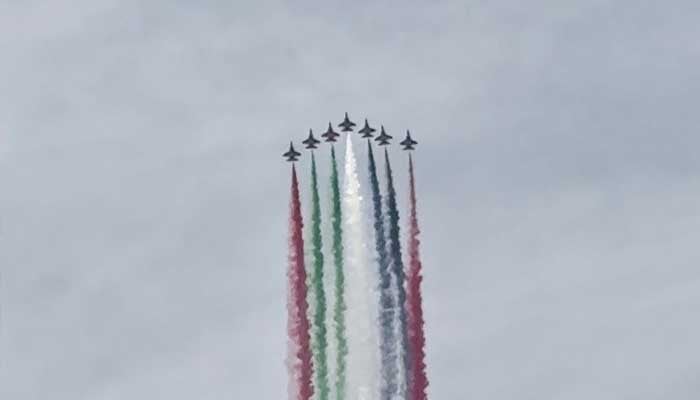
Crowds gathered around the runway and viewing stands as teams showcased high-speed turns, formations and signature stunts.
Pakistan’s JF-17 Thunder remained a major attraction. The multirole fighter impressed aviation enthusiasts with its agility during the aerobatic segment and later drew large groups of visitors at the static display.
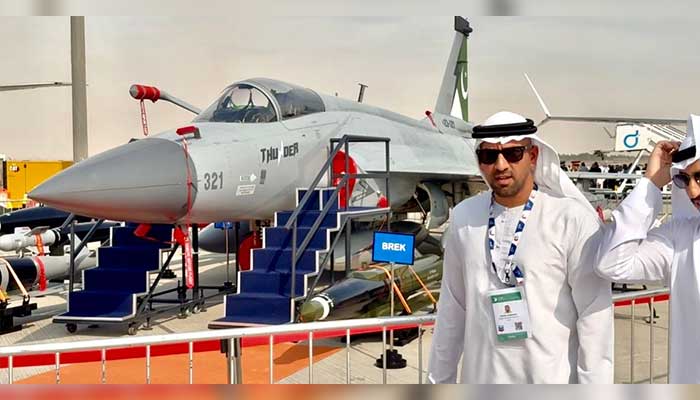
Many attendees stopped to take photos of the aircraft and ask technical questions from the Pakistan Air Force officials present.
Pakistani pilots also became a highlight, with participants lining up for pictures and selfies following their performance. Visitors praised the professionalism and display routine of the PAF team, calling it “one of the best crowd-pullers” of the day.
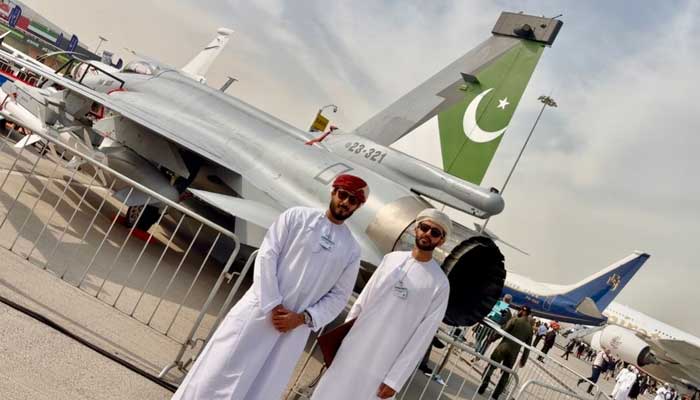
The five-day airshow will continue to feature defence announcements, aircraft showcases and daily demos from international manufacturers and air forces.
Politics
Trump signals green light for Saudi F-35 deal ahead of key Mohammed bin Salman talks
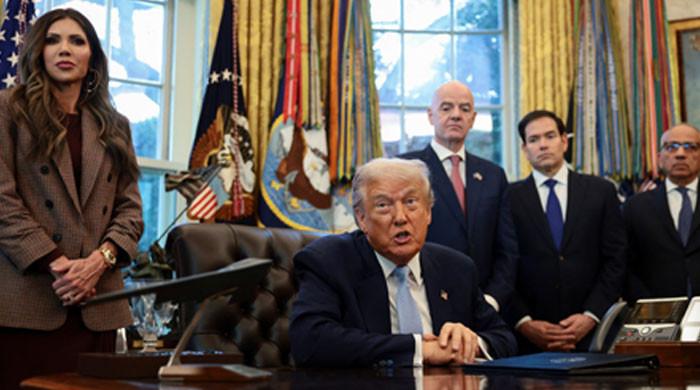
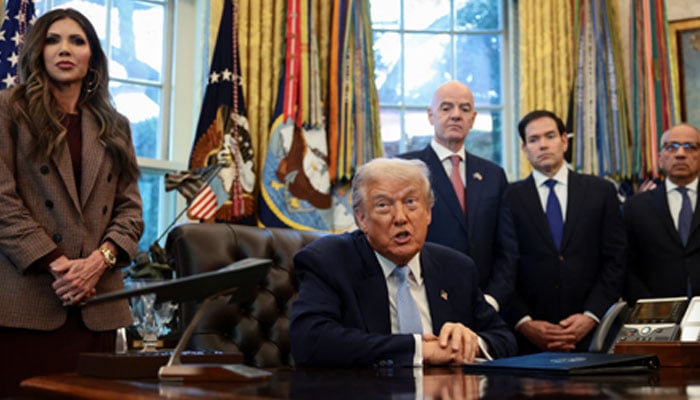
- Trump says “we’ll be selling the F-35s” during Oval Office remarks.
- Sale marks major policy shift, could test Israel’s military edge.
- KSA wants up to 48 jets in Pentagon-cleared multibillion-dollar deal.
President Donald Trump said on Monday he plans to approve the sale of US-made F-35 fighter jets to Saudi Arabia, speaking a day before he hosts Saudi Crown Prince Mohammed bin Salman (MBS) for a day of diplomacy.
“I will say that we will be doing that,” Trump told reporters in the Oval Office. “We’ll be selling the F-35s.”
A sale would mark a significant policy shift, potentially altering the military balance in the Middle East and testing Washington’s definition of maintaining Israel’s “qualitative military edge.”
Saudi Arabia has requested the purchase of as many as 48 F-35 fighter jets, a potential multibillion-dollar deal that has cleared a key Pentagon hurdle ahead of bin Salman’s visit, Reuters reported early this month.
The Saudis have long been interested in Lockheed Martin’s fighter. A senior White House official told Reuters before Trump spoke that the president wanted to talk to the crown prince about the jets, “then we’ll make a determination.”
Trump´s approval comes despite a New York Times report that US officials had raised concerns that superpower rival China could acquire the sophisticated warplane’s technology if the sale to Saudi Arabia went through.
The US has so far only allowed the sales of F-35s to its closest allies, including a number of European NATO allies and Israel.
Washington kicked Turkey out of the F-35 programme in 2019 because Ankara’s purchase of a Russian air defence system sparked fears that Moscow could acquire the plane’s technology through the back door.
AI, nuclear on agenda
The crown prince’s, widely known by his initials MBS, visit to the White House for talks with the US president aims to deepen decades-old cooperation on oil and security while broadening ties in commerce, technology and potentially even nuclear energy.
It will be the first trip by the crown prince to the US since 2018.
Trump is seeking to cash in on a $600 billion Saudi investment pledge made during Trump’s visit to the kingdom in May. He steered clear of mentioning human rights concerns during that trip and is expected to do so again.
The Saudi leader is seeking security guarantees amid regional turmoil and wants access to artificial intelligence technology and progress toward a deal on a civilian nuclear programme.
Focus on defence deal
The Washington and the Riyadh have long had an arrangement for the kingdom to sell oil at favourable prices and for the superpower to provide security in exchange.
That equation was shaken by Washington’s failure to act when Iran struck oil installations in the kingdom in 2019. Concerns resurfaced in September, when Israel struck Doha, Qatar, in an attack it said targeted members of Palestinian group Hamas.
In the aftermath, Trump signed a defence pact with Qatar via executive order. Many analysts, diplomats and regional officials believe the Saudis will get something similar.
Saudi Arabia has sought a defence pact ratified by the US Congress in recent negotiations. But Washington has made that contingent on the kingdom normalising ties with Israel.
Riyadh has in turn linked that to a commitment from Israel’s government, the most right-wing in its history, to Palestinian statehood. Israeli Prime Minister Benjamin Netanyahu, who agreed to a Trump-brokered ceasefire with Hamas in Gaza last month after two years of war, on Sunday reaffirmed his staunch opposition to Palestinian independence.
A Trump executive order on defence similar to the pact with Qatar would fall short of the defence agreement the Saudis have sought. But Alghashian said it would “be a step on the way, part of the process, not the end of the process.”
A Western diplomat based in the Gulf summed up the dynamic: “Trump wants normalisation and Saudi wants a full defence pact, but the circumstances don’t allow. In the end, both sides will likely get less than they want. That’s diplomacy.”
Dennis Ross, a former Middle East negotiator for Democratic and Republican administrations now at the Washington Institute for Near East Policy, said he expects an executive order that would call for the US and the Saudis “to immediately consult on what to do in response to the threat” while not committing Washington to actively come to the defence of Riyadh.
“That could run the gamut of providing a range of different assistance, replacing arms, deploying defensive missile batteries like THAAD or Patriot, deploying naval forces with a Marine unit – to actively taking part in the combat in an offensive not only defensive manner,” he said.
Deal key amid regional rivalry
Riyadh has also been pressing for deals in nuclear energy and artificial intelligence under its ambitious Vision 2030 plan to diversify its economy and strengthen its position relative to regional rivals.
Securing approval to acquire advanced computer chips would be critical to the kingdom’s plans to become a central node in global AI and to compete with the United Arab Emirates, which in June signed a US multibillion-dollar data centre deal that gave it access to high-end chips.
MBS also wants to strike an agreement with Washington on developing a Saudi civilian nuclear programme, part of his effort to diversify from oil.
Such a deal would unlock access to US nuclear technology and security guarantees and help Saudi Arabia level up with the UAE, which has its own programme, and traditional foe Iran.
But progress on a US deal has been difficult because the Saudis did not want to agree to a US stipulation that would rule out enriching uranium or reprocessing spent fuel – both potential paths to a bomb.
Ross said he expected an announcement of an agreement on nuclear energy, or at least a statement on progress towards one.
Politics
UK councillor vindicated over false Palestine-related allegations
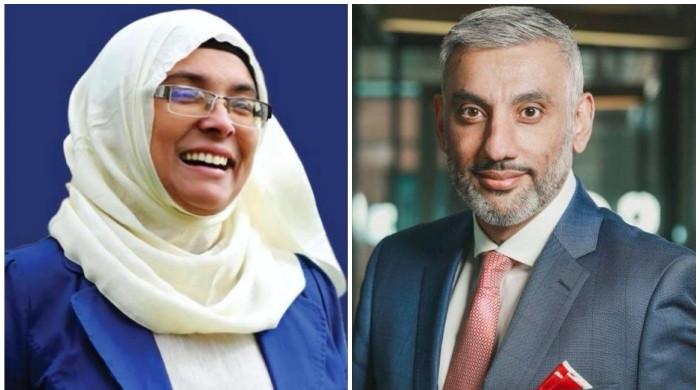
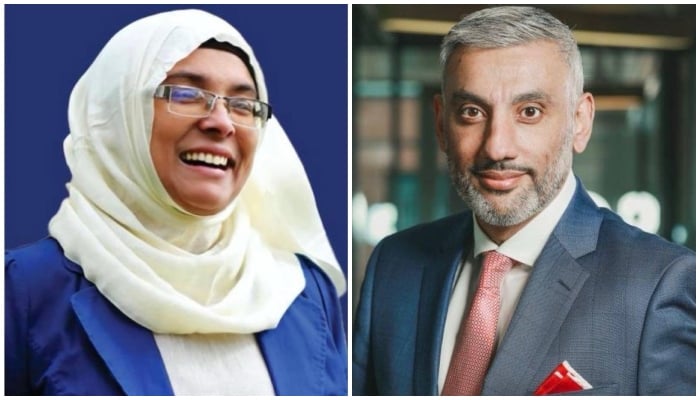
LONDON: A local authority with a large South Asian population has found that Independent Councillor Noor Jahan Begum breached the Councillor Code of Conduct after making a series of unfounded and serious allegations against Labour Councillor Tanweer Khan — using the issue of Palestine for local political gain.
The Redbridge Council Standards Committee’s ruling follows a detailed independent investigation and a formal public hearing. The Committee concluded that Councillor Begum misled the investigation, lied during the process, and colluded with her niece, who had submitted a separate complaint against Councillor Khan. Both women failed to disclose their family relationship, despite living at the same address.
Councillor Khan had alleged that on April 10, 2025, Councillor Begum distributed misleading leaflets against him in a local ward; that she behaved in a stalking manner outside the Ilford Islamic Centre on 18 April 2025; and that she engaged in misconduct while responding to this complaint, supporting her relative’s complaint on the same matter. The leaflets falsely alleged that Khan, as Chair of the Council’s Pension Fund Committee, was not supporting the “divestment” campaign relating to the Local Government Pension Scheme. They implied that he was pro-Israel, pro-Zionism, and anti-Palestine.
Councillor Begum denied all allegations. However, the Council found that on April 10 she was in her ward distributing leaflets and speaking to residents, and that she had made claims — including that Councillor Khan had behaved in a misogynistic manner — that were not supported by evidence. Regarding the allegation that she distributed leaflets outside the Ilford Islamic Centre in order to harass Khan, the Sub-committee made no findings, citing a lack of evidence that harassment had occurred.
The Sub-committee concluded that Councillor Begum made statements and allegations that were inconsistent with incontrovertible evidence. It agreed with the Investigator that she had deliberately minimised her involvement with the Redbridge Palestine Solidarity Campaign; falsely claimed she was not leafleting; downplayed her relationship with a member of the public by stating she only knew her from demonstrations, despite them being related; claimed Councillor Khan approached by car when CCTV showed he was on foot; denied delivering leaflets despite photographic evidence; and altered her statements during the investigation.
The Sub-committee found that in all these instances, Councillor Begum was acting in her official capacity. She used the title of councillor when making her complaint, her conduct related to her role as a councillor when making allegations against another councillor, and she participated as an elected member in a formal process concerning alleged breaches of the Code of Conduct.
The Council found that although the language used in the leaflets about Khan was extremely harsh, it fell within the bounds of freedom of speech. However, Councillor Begum’s dishonesty and her failure to act with integrity when making and supporting a complaint did breach the Code in relation to respect—because she made untrue claims capable of causing both personal and professional harm—and disrepute, as her dishonest behaviour brought her role and the London Borough of Redbridge into disrepute. Her actions eroded public trust by involving a closely related witness whose relationship with her was concealed.
Without offering her a right of appeal, the Committee recommended that Councillor Begum be removed from all committees for six months, attend training arranged by the Monitoring Officer within six weeks, and that the Monitoring Officer consider any further necessary action.
The investigation also raised concerns about the misuse of sensitive international issues to inflame local politics. Throughout the dispute, Councillor Begum portrayed Councillor Khan as aligned with pro-Israel positions, despite his long-standing, publicly documented support for Palestinian rights.
Speaking after the decision, Councillor Khan said: “The Committee’s ruling highlights how such claims can be weaponised to cause reputational and personal harm. My record on Palestinian rights is clear and a matter of public record. What my family and I have endured over these months has been deeply distressing, but I am grateful that the truth has now been established. I have supported the cause of Palestine all my life and I will always stand by the Palestinian people’s right to self-determination. I was hounded and defamed.”
He added that Councillor Begum had publicly demanded that Redbridge Council divest from companies such as Amazon, yet “records show that her own by-election campaign was financially supported by Capumen, a recruitment company that lists Amazon as a major client. This raises serious issues of political and moral hypocrisy.”
Councillor Begum said in a statement: “The Council did not follow due process. They failed to correctly investigate my complaint against Mr Khan and have publicly censured me for making a retaliatory complaint. I strongly disagree and will be making a complaint to the Local Govt Ombudsman.”
Politics
Bangladesh demands India extradite convicted ex-PM Hasina
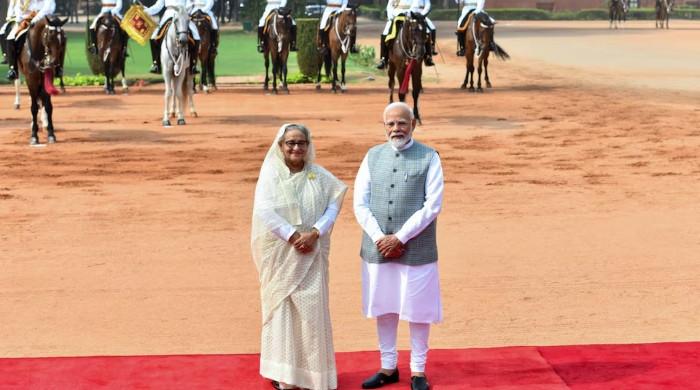
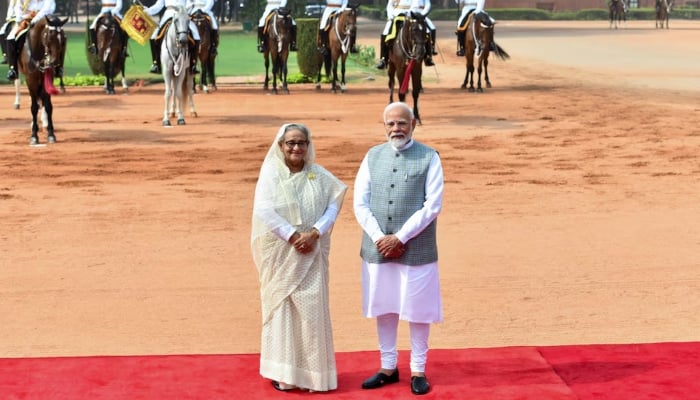
- Former interior minister also faces extradition.
- India notes verdict, avoids extradition response.
- Muhammad Yunus calls verdict a historic milestone.
DHAKA: Bangladesh on Monday demanded India extradite ousted former prime minister Sheikh Hasina, hours after she was sentenced to hang for crimes against humanity.
Hasina’s autocratic rule was backed by New Delhi, and the 78-year-old fled to India after her ouster in a mass uprising in August 2024, fraying relations between the two neighbours.
She has been in hiding ever since.
On Monday a court in Dhaka sentenced Hasina as well as former interior minister Asaduzzaman Khan Kamal to death in absentia, after being found guilty of crimes against humanity over a deadly crackdown against last year’s student-led uprising.
The former minister’s whereabouts are not known, but Bangladesh says he is also in India.
“We urge the government of India to immediately extradite the two convicts to the Bangladeshi authorities,” Dhaka’s foreign ministry said in a statement, saying it was “an obligatory responsibility for India”.
Bangladesh warned that “granting asylum to these convicts… would be extremely unfriendly and an affront to justice.”
India’s foreign ministry said that it had “noted the verdict” of Hasina.
“India remains committed to the best interests of the people of Bangladesh, including in peace, democracy, inclusion and stability,” the ministry said in a statement that does not directly address the issue of potential extradition.
Hasina’s 15-year tenure saw widespread human rights abuses, including the mass detention and extrajudicial killings of her political opponents.
Bangladesh last year said it would request an Interpol red notice for Hasina, but there was no record on the global police body alert law enforcement list.
Bangladesh’s interim leader Muhammad Yunus welcomed the verdict.
“The awarding of death sentences to Sheikh Hasina and Asaduzzaman Khan Kamal in the crimes against humanity case is a historic verdict,” the Nobel Peace Prize winner said in a statement.
He called for calm and warned against any “attempt to violate public order”, urging “everyone to refrain from any indisciplined acts”.
Hasina’s son and adviser, Sajeeb Wazed, told Reuters on the eve of the verdict that they would not appeal unless a democratically elected government took office with the Awami League’s participation.
During the trial, prosecutors told the court that they had uncovered evidence of her direct command to use lethal force to suppress a student-led uprising in July and August 2024.
According to a United Nations report, up to 1,400 people may have been killed during the protests between July 15 and August 5, 2024, with thousands more injured — most of them by gunfire from security forces
Hasina was represented by a state-appointed defence counsel who told the court that the charges against her were baseless and pleaded for her acquittal.
Ahead of the verdict, Hasina dismissed the accusations and the fairness of the Tribunal proceedings, asserting a guilty verdict was “a foregone conclusion.”
Bangladesh has been tense ahead of the verdict, with at least 30 crude bomb explosions and 26 vehicles torched across the country over the past few days. There have been no casualties, however.
‘Politically motivated’
Hasina, 78, who has remained in India since she was overthrown in August 2024, challenged the legitimacy of the Tribunal in an email interview with Reuters last month.
“These proceedings are a politically motivated charade,” she said. “They have been brought by kangaroo courts, with guilty verdicts a foregone conclusion. They are presided over by an unelected government which consists of my political opponents.”
She also said she was denied adequate notice of the hearings and any meaningful opportunity to mount a defence, adding that she was not personally involved in the use of lethal force or other alleged crimes.
The Muslim-majority South Asian country of 170 million people has been governed by an interim administration headed by Nobel Peace laureate Muhammad Yunus since Hasina fled. Although the country has been largely peaceful since, political stability is yet to return.
In the Reuters interview, Hasina warned of growing anger among supporters of the Awami League and said that millions of party loyalists would boycott the parliamentary elections in February.
On Monday, security remained tight across Dhaka and other major cities, with paramilitary forces deployed around key government buildings and the tribunal complex.
Authorities said they were prepared for any trouble after the verdict.
-

 Tech1 week ago
Tech1 week agoFrom waste to asset: Turning ethanol production CO₂ into jet fuel
-

 Tech2 days ago
Tech2 days agoNew carbon capture method uses water and pressure to remove CO₂ from emissions at half current costs
-
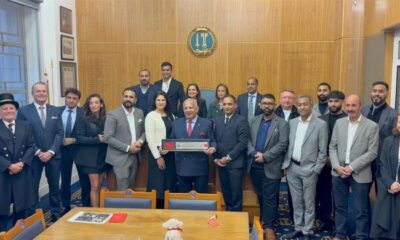
 Politics4 days ago
Politics4 days agoBritish-Pakistani honoured for transforming UK halal meat industry
-

 Sports2 days ago
Sports2 days agoTexas A&M officer scolds South Carolina wide receiver after touchdown; department speaks out
-
Sports1 week ago
College football winners and losers: The catch of the year saves Indiana
-

 Business1 week ago
Business1 week agoMore than 1,000 flights cancelled as US air traffic cuts enter second day
-

 Politics5 days ago
Politics5 days agoInternet freedom declines in US, Germany amid growing online restrictions
-

 Fashion3 days ago
Fashion3 days agoAfter London, Leeds and Newcastle, next stop Glasgow for busy Omnes






